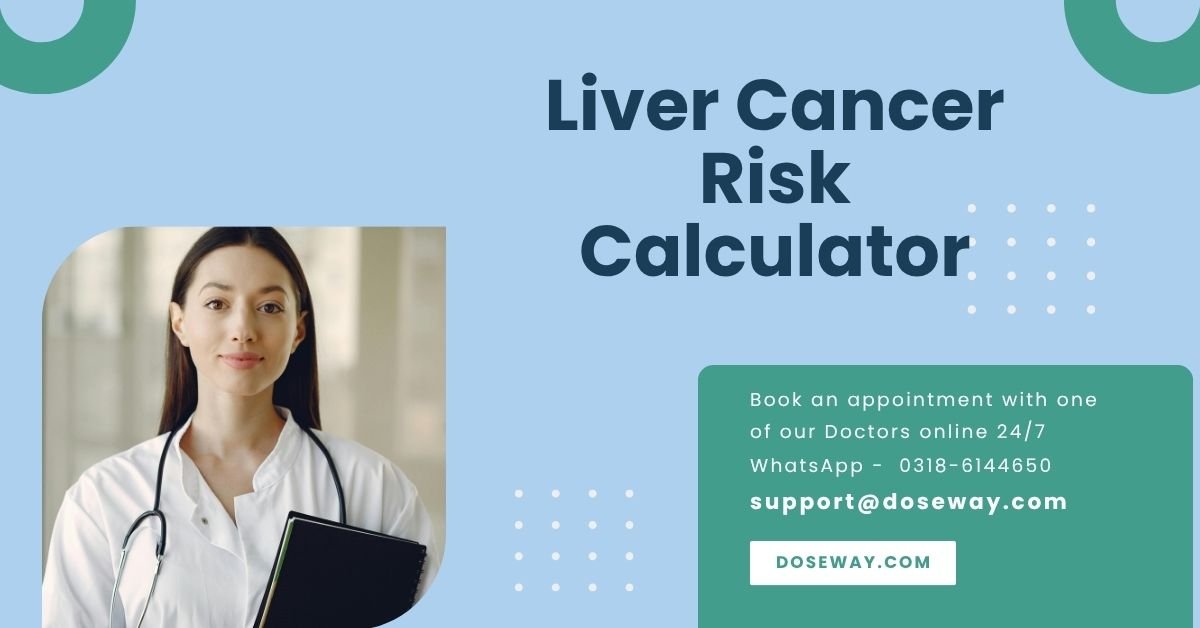Liver Cancer Risk Calculator
Assess your risk for liver cancer based on clinical factors and lifestyle choices. This tool helps identify potential risk factors and provides personalized recommendations.
Liver Cancer Risk Assessment
Based on the information you provided, your calculated risk score is:
Risk Score: 12/100
Interpretation
Your liver cancer risk is currently low. This is likely due to your healthy lifestyle and lack of major risk factors. Continue with your positive health habits.
Personalized Recommendations
- Maintain a healthy diet rich in fruits, vegetables, and whole grains
- Continue regular exercise and physical activity
- Limit alcohol consumption to recommended levels
- Schedule regular check-ups with your healthcare provider
Liver Cancer Risk Assessment Report
Patient Information
Medical History
Risk Assessment Results
Risk Visualization
Personalized Recommendations
Try More Free Tools:
- Try Our Thyroid Cancer Risk Calculator
- Try Our Pancreatic Cancer Risk Calculator
- Try Our Ovarian Cancer Risk Calculator
Liver Cancer Risk Calculator

Table Of Contents
What Is a Liver Cancer Risk Calculator?
A Liver Cancer Risk Calculator is a simple tool that helps estimate your chances of developing liver cancer based on your health data. This tool uses important factors such as age, gender, HBV or HCV infection status, liver cirrhosis, alcohol consumption, smoking habits, ALT/AST levels, and family history of cancer to assess risk. It gives you a general idea of whether you fall into a low, medium, or high-risk category.
This article will help you understand how this calculator works, what data it needs, and what the results mean. It’s an educational guide to support your liver health awareness.
What Is Liver Cancer?
Liver cancer happens when abnormal cells grow out of control in the liver. The most common type is hepatocellular carcinoma (HCC). It’s more common in people with long-term liver diseases, such as hepatitis B, hepatitis C, or cirrhosis.
Liver cancer often shows no symptoms in the early stages. That’s why risk calculators are helpful tools to estimate early risk and take preventive steps.
Why Use a Liver Cancer Risk Calculator?
This calculator is designed for people who may be at risk for liver cancer due to:
- Chronic hepatitis B or C infections
- Long-term alcohol use
- Fatty liver disease (NAFLD/NASH)
- Cirrhosis
- Family history of liver or other cancers
- Elevated liver enzyme levels
- Smoking
What Does the Calculator Measure?
The Liver Cancer Risk Calculator collects the following key inputs:
| Risk Factor | Why It Matters |
|---|---|
| Age | Older age increases liver cancer risk. |
| Gender | Men are generally at higher risk than women. |
| Hepatitis B/C Infection | Chronic infections damage the liver and increase cancer risk. |
| Cirrhosis | Permanent liver damage from any cause leads to high cancer risk. |
| ALT/AST Levels | High liver enzyme levels may indicate inflammation or liver damage. |
| Alcohol Consumption | Heavy drinking can damage the liver and raise cancer risk. |
| Smoking | Smoking adds to overall cancer risk. |
| Family History of Cancer | Inherited factors may play a role. |
| Diabetes/Obesity | Metabolic issues increase the chances of fatty liver disease and liver cancer. |
How Does the Liver Cancer Risk Calculator Work?
The calculator uses risk models based on research data. These models look at each factor and assign a score. Then, it adds up the score to estimate your overall liver cancer risk.
Risk Categories:
| Score Range | Risk Level | What It Means |
|---|---|---|
| 0–3 | Low | Minimal risk; continue healthy habits and regular check-ups. |
| 4–6 | Moderate | Moderate risk; consider talking to your doctor and screening options. |
| 7+ | High | High risk; schedule a medical consultation as soon as possible for detailed evaluation and testing. |
Understanding the Results
Once you enter your details and get a result, here’s how to interpret it:
- Low Risk – No urgent action needed. Maintain a healthy liver lifestyle.
- Moderate Risk – Pay attention to liver health. Consult a healthcare provider for follow-up.
- High Risk – Strongly consider seeing a liver specialist. Screening tests like AFP and imaging may be advised.
How to Reduce Your Liver Cancer Risk
If your result shows moderate or high risk, here are some preventive steps:
- Get vaccinated for Hepatitis B
- Treat any Hepatitis C infection
- Avoid alcohol and smoking
- Eat a liver-friendly diet (low fat, high fiber)
- Maintain a healthy weight
- Go for regular check-ups and liver function tests
Who Should Use This Calculator?
This calculator is useful for:
- Adults over 30
- People with liver disease
- Hepatitis B or C patients
- Family history of liver cancer
- People with alcohol use or smoking
- Anyone concerned about liver health
Conclusion
The Liver Cancer Risk Calculator is a helpful tool to estimate your personal risk level based on common health factors. It can guide you toward preventive steps and early detection. While it doesn’t replace professional care, it can help start an important conversation about liver health with your doctor.
Use this free tool today and take charge of your liver health. Early action can save lives.
FAQs
What is a Liver Cancer Risk Calculator?
A Liver Cancer Risk Calculator is a tool that helps estimate your chances of getting liver cancer based on key health information like age, liver disease, hepatitis infections, alcohol use, and more.
What should I do if I’m at high risk?
If your result is high risk, it’s best to talk to a doctor immediately. They may suggest:
Blood tests like AFP (Alpha-Fetoprotein)
Imaging tests such as ultrasound or MRI
A liver biopsy or regular monitoring
Can this calculator diagnose liver cancer?
No. This tool is meant to estimate risk, not to diagnose. Only a healthcare professional can diagnose liver cancer using clinical tests.

 Cart is empty
Cart is empty
Add a Comment